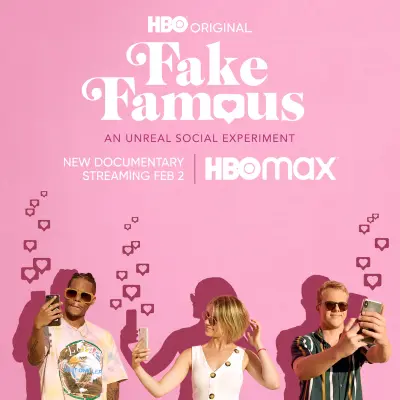There's a lot of disingenuousness afoot in HBO's Fake Famous
-

The HBO documentary from Hatching Twitter author and tech journalist Nick Bilton is "frequently fun and damningly flimsy — perhaps like online fame itself," says Daniel Fienberg. "When producers of reality TV are looking to reframe the narratives around their project from 'trash' to 'substance,' a common tactic is to refer to the show as a 'social experiment,'" says Fienberg. "Jeff Probst does it all the time on Survivor. Ashton Kutcher went so far as to deem a little show called Beauty and the Geek 'the ultimate social experiment.' It's a strategy Nick Bilton, a longtime journalist making his directing debut, uses repeatedly on HBO's Fake Famous. Whether that cements its place as the Morgan Spurlock-esque blend of weighty and frivolous it obviously intends to be or just reminds you that it's basically an early '00s reality show without enough process to fill multiple hours is up to the viewer. Packaging this flimsy-yet-generally-entertaining production as an 'HBO documentary' probably draws an audience too snobby to watch a hypothetical Who Wants to Be a Social Media Star? on The WB. That, and I mostly don't mean it pejoratively, is what Fake Famous is." Fienberg adds: "A lot of the games Bilton is playing with his three protégés are fun, but they can't rival the games he's playing with the audience to obscure what is manifestly and instantly clear: that he chose three people for his 'social experiment' and two of them are duds. Even if you think that they're interesting duds — and they are, which is why I'm not "spoiling" the nature of their dud-ness — at a very early point, Bilton the filmmaker has to start compensating for how his three-pronged narrative suddenly has only one prong. And that's before COVID-19 hits, forcing both abrupt truncation and an artificially imposed thematic conclusion that, as I'm willing to bet Bilton the journalist would probably confess, the rest of his story didn't earn."
ALSO:
- Fake Famous ends with a dark warning about the emptiness of internet stardom: "That’s not to say that Fake Famous is a downer," says Arielle Pardes. "Nor does it have the kind of anti-tech agenda of a film like The Social Dilemma, which premiered last fall on Netflix. Instead, the film centers around a social experiment: How easy is it to manufacture celebrity online? Bilton (who appears on-screen regularly and is truly delightful to watch) puts out a casting call in LA for people who want to become famous, and then he selects three guinea pigs....Fake Famous makes this ascent fun to watch, and it makes it all look so easy. When Bilton starts shopping for bots, I momentarily wondered if I should become an influencer too. By the end of the film, he convinced me otherwise. I won't spoil what happens, except to say that not everyone can handle the realities of fake fame."
- Fake Famous is a lame attempt to mock influencer culture: "The film’s disdain for its subject matter is palpable—often for good reason, but at times, to an extent that obscures Bilton’s point," says Tarpley Hitt. "At its crux, Fake Famous is about the incentive structure of social media—a system set up by titanic corporations that encourages people to lie, dissuades others from pointing it out, and ensures the rest keep scrolling. And yet the narrative’s focus on people who take advantage of it, who get trapped in it—the protagonists, but also the (mostly) girls that make up its selfie montages or TikTok clips—often lays blame at the feet of users. The camera seems to finger-wag at whatever moral failure has consumed today’s youth, while invoking a vague nostalgia for earlier times."
- Fake Famous isn't totally down on influencer culture: "Fake Famous makes sure to point out that influencers can have a positive impact, raising awareness of issues like Black Lives Matter and the climate crisis and encouraging voter registration," says Leslie Katz. "But it paints an unsettling picture of a world in which a higher follower count not only enhances feelings of self-worth, but can make you more likely to get hired or attract friends and romance, even if your persona is entirely fabricated."
- Fake Famous exposes how ripe for manipulation this whole culture is, and the powerful incentives to game the system
- Journalist Nick Bilton on the biggest lesson he learned from Fake Famous: "The huge realization I had during the film – beyond just the number of fake followers and fake bots and all this stuff – was how bad the influencer culture makes you feel," he says "I stopped using Instagram for a couple of years ... I remember there was a point where I was pretty depressed and feeling dull, and I didn't realize why. And my wife helped me realize I was looking at these social media accounts with these influencers who are going on all these amazing trips, and I was feeling bad, because I was like: 'Wait, I'm just home. I'm just working all the time. I'm not doing what they're doing.'"
TOPICS: Fake Famous, HBO, Nick Bilton, Documentaries, Instagram, Social Media
More Fake Famous on Primetimer:
